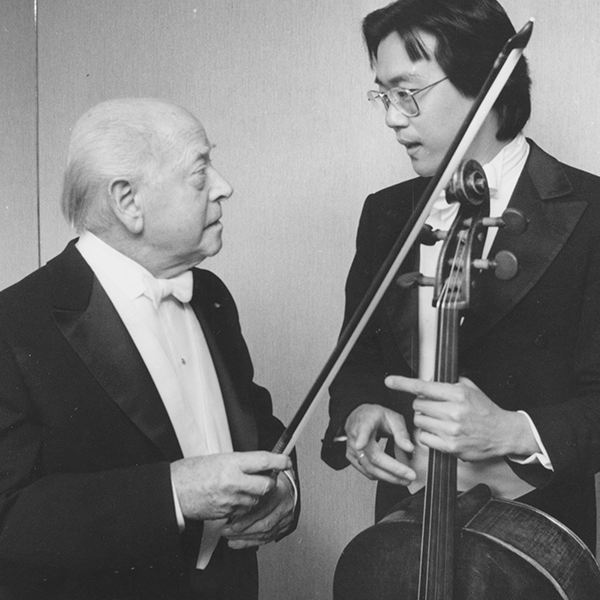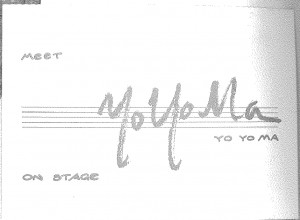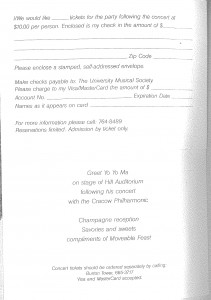Culture Connects Us with Yo-Yo Ma
UMS partnered with Yo-Yo Ma to bring two unforgettable days of inspiration to Michigan.
The musical hero shared personal reflections with an audience of 3,000 in Hill Auditorium on February 27, 2019, followed by a community “Day of Action” in Flint the next day.
Ann Arbor | Culture, Understanding, And Survival
In his special talk titled Culture, Understanding, and Survival, Yo-Yo Ma began by performing musical selections from Bach on both the cello and the piano. “All life is based on theme and variations,” he said, encouraging the audience throughout the presentation to continue to listen to the world around us and toexperiment.



Asked how he keeps repertoire fresh, Mr. Ma remarked, “I play as if it’s the last time I will ever play a piece.” He added that it’s truly a gift to be able to access that feeling.
Flint | Day of Action
Yo-Yo Ma met local community leaders the next morning in Flint, Michigan, to lead a workshop and dialogue around strategies for making local arts more inclusive and accessible to all.



In the afternoon, Mr. Ma hosted a free community cultural showcase in Flint’s historic Berston Field House. An enthusiastic crowd arrived, eager to hear Mr. Ma and talented local artists perform.


Flint singer, rapper, dancer, choreographer, producer, and activist Tunde Olaniran introduced him to a cheering audience to kick off the event!




“Does Flint have talent or what?!” Mr. Ma exclaimed, as he enjoyed performances by local groups, including the Kuungana African Drum and Dance Company, Creative Expressions Dance Studio, The Boys and Girls Club of Flint Steel Band, and El Ballet Folklorico Estudiantil and Flint Mariachi Band.

A fitting end to the community cultural celebration, African drummer Kevin “Baba” Collins joined Yo-Yo Ma in an impromptu, improvised performance!
UMS thanks Yo-Yo Ma for his incredible vision and partnership in bringing these meaningful experiences to life, and demonstrating how #CultureConnectsUs all.
More Bach Inspiration
For more listening inspiration, enjoy Yo-Yo Ma’s new recording of Bach’s Complete Cello Suites on Apple Music or Spotify.
UMS Playlist: Bluegrass by UMS Associate Programming Manager Liz Stover
This post is a part of a series of playlists curated by UMS staff, artists, and community. Check out more music here.
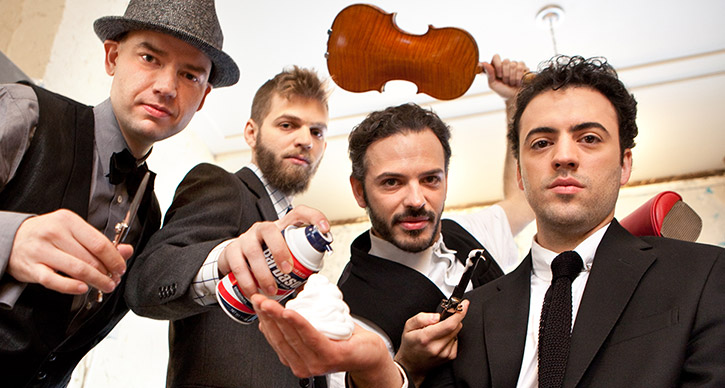
Photo: Brooklyn Rider (performing in Ann Arbor on November 24, 2013). Photo by Sarah Small.
Having grown up in a household where jam bands were in frequent rotation on our stereo, and having developed a musical background in violin, that I eventually loved bluegrass music is no big surprise. Bluegrass is a genre of frequent collaboration — many of the artists in this playlist play in bands together or work on projects with each other while also maintaining their own solo projects or groups.
I fell in love with the music of Punch Brothers when UMS presented them in October 2009 at the Power Center, and have since followed their musical endeavors and discovered other exciting artists along the way. Here in Ann Arbor, we’re also lucky to have the Ark, a stellar local institution that is a national leader in the presentation of folk and bluegrass music.
This season, I can’t wait to welcome back Chris Thile (the mandolin player of the Punch Brothers) in October for a solo performance to follow his forthcoming record release of Bach sonatas and partitas. I am also really excited that we’re bringing banjo player Béla Fleck back with the exciting young string quartet Brooklyn Rider (who are also members of the Silk Road Ensemble) in November, mixing two of my favorite genres, bluegrass and chamber music! If this playlist and those two shows leave you wanting more, check out vocalist Sarah Jarosz or An Evening with Noam Pikelny (banjo), Bryan Sutton (guitar), Jesse Cobb (mandolin), Barry Bales (bass), and Luke Bulla (fiddle), both at the Ark in October.
What did you think about this playlist? Share your thoughts or song suggestions in the comments below.
From our Archive: Yo-Yo Ma with conductor Eugene Ormandy in 1982
From our archives, Yo-Yo Ma with conductor Eugene Ormandy backstage at Hill Auditorium at the 1982 UMS May Festival. Yo-Yo Ma returns to perform with Edgar Meyer and Chris Thile on April 22, 2017.
Last updated 5/2/2016.
Yo-Yo Ma and the Silk Road Project: Musical Journeys
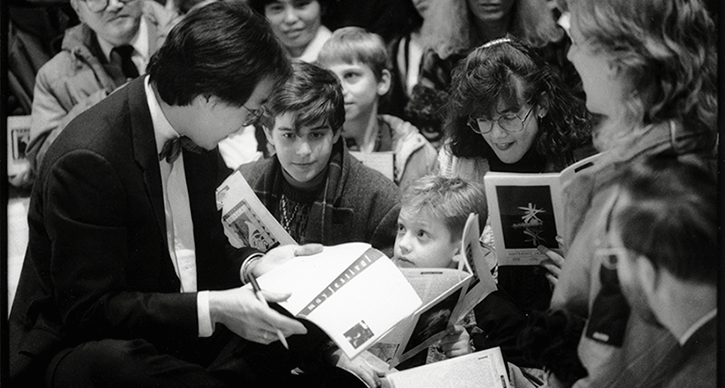
Photo: Yo-Yo Ma sits on the stage and autographs programs for students at Hill Auditorium in 1991.
With their March 16 concert at Hill Auditorium, Yo-Yo Ma and the Silk Road ensemble receive the 2013 UMS Distinguished Artists Award, and Yo-Yo Ma is a name known to almost anyone even casually acquainted with classical instrumental music. Sheer longevity has helped Ma to this point—his performing career began in 1961, at the age of six, and he has an instinct for connecting with general audiences that was second nature to the great virtuosi of the past but isn’t seen so much anymore.
Yet this Parisian-born, Chinese-descended, and for all that thoroughly American cellist has reached a level beyond mere popularity. “Distinguished artist” covers it pretty well. How did he get here? Few would nominate him on purely technical grounds; he does everything well that he needs to, but it’s a keen ear that can identify his playing from its sound alone. Audiences are quick to respond to his personal warmth, and no one should discount that. But it’s a quality he shares with many other musicians.
Most artists follow trends, a few even set them. But rare indeed are the ones like Ma for whom each individual concert is part of a larger, even a lifelong utterance. Yo-Yo Ma’s music brings ideas from a hundred years ago, and it explores others that are absolutely new, and in which he is indeed a pioneer. His music-making carries with it history of ideas, and in this lies its enduring appeal.
Something entirely new in the history of concert music
The Silk Road Project, an incarnation of which appears at UMS’s March 16 special event, was founded in 1998. It’s something entirely new in the history of concert music: not really an ensemble, for as an ensemble it is always changing. Instead, it’s an organization, a framework for collaboration, an ongoing series of programs and educational enterprises—in a word, an idea.
The Silk Road, which also had an important maritime component, was a network of trade routes connecting Asia, the Mediterranean, and Africa from antiquity until the Renaissance era. It was a conduit for much more than silk and other luxury goods, bringing, for a start, Buddhism to China, ancient Greek art to Central Asia and points east, and Indian religions and finally Islam to Indonesia. Why do statues of the Buddha look Greek? The artistic ramifications of these developments, stretching over more than a millennium, are countless, and each new Silk Road Project recording or performance brings the feeling that the surface has only been scratched.

Image courtesy of UNESCO.org.
The Silk Road Project is indeed something new, yet it’s something old as well. It’s difficult for modern audiences to put themselves in the place of those in the late nineteenth century, when lines between classical and popular music were not so firmly drawn, and when a virtuoso was often a player who brought a whiff of exotic lands. With the Silk Road Project, Yo-Yo Ma is in part reflecting on his own heritage and on the many cultures in its orbit. Classical music has always relied on the physical presence of the virtuoso to keep it in touch with the music of the wider world and avoid losing itself in insular delusions of linear progress, and looked at in one way, Ma is the heir to a musician like violinist Pablo de Sarasate, whose repertory traced a semicircle from Spain to Venice Eastern Europe around classical music’s increasingly Germanic core.
Sarasate performs:
Yet, for all that, Yo-Yo Ma is a product of the idealistic middle twentieth century, when classical music seemed able to spread a kind of enlightenment. He made his name not with Asian music but with Bach’s suites for solo cello, following the mold of an artist whose influence on him has been a bit obscured by the fact that their styles are different: Pablo Casals. Ma played under the 90-year-old Casals in the Marlboro Festival Orchestra in Vermont, and Casals went on, at 95, to write a Hymn to the United Nations (with text by W.H. Auden), and Yo-Yo Ma numbers among his honors that of official United Nations Messenger of Peace.
A Hymn to the United Nations:
The Silk Road Project rests on this foundation of idealism. It has been the major artistic decision of Yo-Yo Ma’s middle age, and it weaves together strands of culture from wide ranges of space and time. Each Silk Road Ensemble concert brings something of exotic cultures, of classical idealism, and of new world fusions, yet each one is different. As an explorer of world music Ma is unusual and fresh; as a visionary who sees how world music relates to the classical tradition and its capacity for historical reflection, he is a unique treasure. He has a keen eye for talent, a healthy disregard for genre, and a willingness to try new things that is nothing short of marvelous in the later stages of a classical career. Distinguished, indeed.
UMS Arts Roundup: November 19
Many members of the UMS staff keep a watchful eye on local and national media for news about artists on our season, pressing arts issues, and more. Each week, we pull together a list of interesting stories and share them with you. Welcome to UMS’s Arts Round-up, a weekly collection of arts news, including national issues, artist updates, local shout-outs, and a link or two just for fun. If you come across something interesting in your own reading, please feel free to share!
Arts Issues
- What’s next on the list to download to your ipod? Ballet!
- The use of captions during plays give theaters access to new audiences, including the hearing impaired.
- 2011 Edinburgh International Festival to focus on Asian culture and influence.
Artist Updates
- World famous composer Philip Glass writes a new opera, to premiere in 2013.
- Alongside 14 others, Yo-Yo Ma is awarded the Presidential Medal of Freedom—the country’s highest civilian honor—from President Obama.
UMS News
- Annarbor.com performance review of Stew & the Negro Problem at the old Leopold’s pub. Additional performances on Friday and Saturday!
Local Shout-Outs
- Intriguing exhibit opens at DIA, looking at artist fakes and the detective work used to verify artworks.
- Students host EMU music festival featuring local bands.
Just For Fun
- Check out this circus-like version of “Swan Lake” that has lately been making the rounds on youtube. Amazing or horrifying? You decide!
This Day in UMS History: The Cracow Philharmonic (Jan 11, 1986)
January 11, 1986
Hill Auditorium
The Cracow Philharmonic (Orchestra of the Karol Szymanowski Philharmonic in Cracow)
Tadeusz Strugala, principal conductor and artistic director
Krzysztof Penderecki, guest conductor
Yo-Yo Ma, cellist
Program
Penderecki: The Awakening of Jacob (1974)
Penderecki: Concerto #2 for Cello and Orchestra (1982)
Shostakovich: Symphony #6 in b minor, Op. 54 (1939)
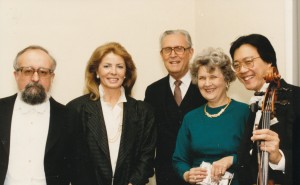
Backstage at Hill Auditorium: (from left to right) Composer & Conductor Krzysztof Penderecki with wife Elzbieta, UMS President Gail Rector and wife Beth, Cellist Yo-Yo Ma (from the UMS Photo Archive)
Hill Auditorium saw a remarkable meeting of cultures at this concert: a Polish orchestra gave the Ann Arbor premiere of a Russian symphony, and a Chinese-American cellist played a cello concerto written by a Polish composer for a Russian cellist, Mstislav Rostropovich.
Born in 1933, Krzysztof Penderecki was at the forefront of classical composition, and had been called “the musical personification of Poland.” He had already written a violin concerto for Isaac Stern, a Christmas Symphony for Zubin Mehta and the New York Philharmonic, and a Te Deum, dedicated to his fellow-countryman Pope John Paul II. His Polish Requiem, inspired by Poland’s Solidarity Movement, was premiered under the baton of Rostropovich in 1984.
UMS audiences have seen Yo-Yo Ma many times over the years, most recently in 08/09 UMS season with the Silk Road Ensemble. Twenty-three years ago, at age 30, he was already a veteran of the classical music world, having won a Grammy for his recording of the Bach Suites for Solo Cello (1984) and being described by the London Daily Telegraph as “among the finest instrumentalists of our time.”
At this concert, UMS audience members were invited to meet Yo-Yo Ma on the Hill Auditorium stage after the concert. Here’s a scan of the original invitation.
“This day in UMS History” is an occasional series of vignettes drawn from UMS’s historical archive. If you have a personal story or particular memory from attending the performance featured here, we’d love to hear from you in the comments.


